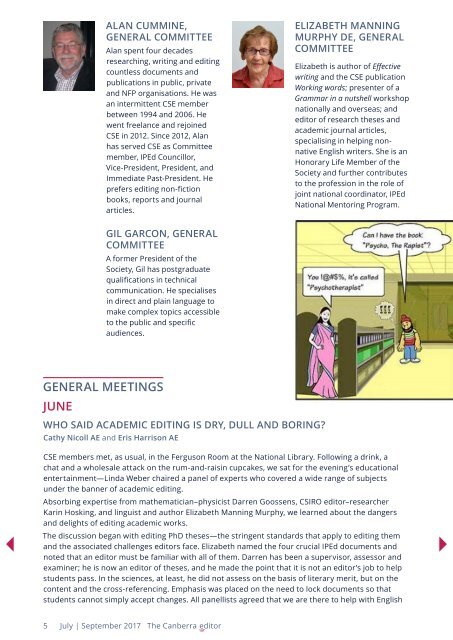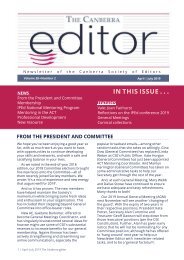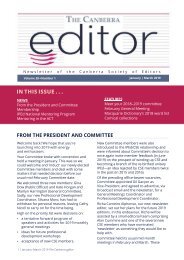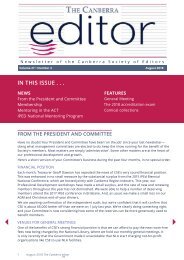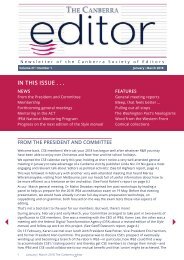The Canberra Editor July-September 2017
Newsletter of the Canberra Society of Editors
Newsletter of the Canberra Society of Editors
Create successful ePaper yourself
Turn your PDF publications into a flip-book with our unique Google optimized e-Paper software.
ALAN CUMMINE,<br />
GENERAL COMMITTEE<br />
Alan spent four decades<br />
researching, writing and editing<br />
countless documents and<br />
publications in public, private<br />
and NFP organisations. He was<br />
an intermittent CSE member<br />
between 1994 and 2006. He<br />
went freelance and rejoined<br />
CSE in 2012. Since 2012, Alan<br />
has served CSE as Committee<br />
member, IPEd Councillor,<br />
Vice-President, President, and<br />
Immediate Past-President. He<br />
prefers editing non-fiction<br />
books, reports and journal<br />
articles.<br />
ELIZABETH MANNING<br />
MURPHY DE, GENERAL<br />
COMMITTEE<br />
Elizabeth is author of Effective<br />
writing and the CSE publication<br />
Working words; presenter of a<br />
Grammar in a nutshell workshop<br />
nationally and overseas; and<br />
editor of research theses and<br />
academic journal articles,<br />
specialising in helping nonnative<br />
English writers. She is an<br />
Honorary Life Member of the<br />
Society and further contributes<br />
to the profession in the role of<br />
joint national coordinator, IPEd<br />
National Mentoring Program.<br />
GIL GARCON, GENERAL<br />
COMMITTEE<br />
A former President of the<br />
Society, Gil has postgraduate<br />
qualifications in technical<br />
communication. He specialises<br />
in direct and plain language to<br />
make complex topics accessible<br />
to the public and specific<br />
audiences.<br />
GENERAL MEETINGS<br />
JUNE<br />
WHO SAID ACADEMIC EDITING IS DRY, DULL AND BORING?<br />
Cathy Nicoll AE and Eris Harrison AE<br />
CSE members met, as usual, in the Ferguson Room at the National Library. Following a drink, a<br />
chat and a wholesale attack on the rum-and-raisin cupcakes, we sat for the evening’s educational<br />
entertainment—Linda Weber chaired a panel of experts who covered a wide range of subjects<br />
under the banner of academic editing.<br />
Absorbing expertise from mathematician–physicist Darren Goossens, CSIRO editor–researcher<br />
Karin Hosking, and linguist and author Elizabeth Manning Murphy, we learned about the dangers<br />
and delights of editing academic works.<br />
<strong>The</strong> discussion began with editing PhD theses—the stringent standards that apply to editing them<br />
and the associated challenges editors face. Elizabeth named the four crucial IPEd documents and<br />
noted that an editor must be familiar with all of them. Darren has been a supervisor, assessor and<br />
examiner; he is now an editor of theses, and he made the point that it is not an editor’s job to help<br />
students pass. In the sciences, at least, he did not assess on the basis of literary merit, but on the<br />
content and the cross-referencing. Emphasis was placed on the need to lock documents so that<br />
students cannot simply accept changes. All panellists agreed that we are there to help with English<br />
5 <strong>July</strong> | <strong>September</strong> <strong>2017</strong> <strong>The</strong> <strong>Canberra</strong> editor


